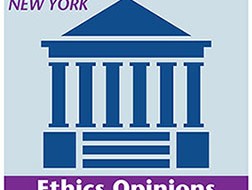NYSBA Reverses Stand on Contingent Post-Divorce Collection Fees
By Lazar Emanuel [Originally published in NYPRR April 2002]
After 25 years, the State Bar has decided that under the present rules, a New York lawyer may not “enter into an arrangement for, charge, or collect a contingent fee in a post-divorce action to collect past due maintenance, child support and/or alimony based upon a final judgment previously entered.” [N.Y. State Ethics Opinion 747 (2001).] In so doing, the NYSBA overruled Ethics Opinion 443 (1976) and modified Ethics Opinion 690 (1997). In passing, the State Bar noted that its new ruling contradicts the opinions of two other bar associations in New York State.
The State Bar reviewed the history of changes in the New York Code of Professional Responsibility and in Part 1400 [22 NYCRR §1400.1] which compelled the new Opinion. In 1990, New York’s Code was amended to include, for the first time, a disciplinary rule prohibiting a contingent fee in most domestic relations matters. The amendment was contained in DR 2-106(C)(2), based upon Model Rule 1.5(d).
In 1993, the Appellate Divisions adopted the rules still embodied in Part 1400. These rules prohibit contingent fee agreements not only in the initial proceedings to obtain a divorce, custody, child support and/or maintenance, but also in subsequent proceedings “to enforce or modify a judgment or order in connection with any such claims, actions or proceedings.” Rule 1400.2 reinforces this prohibition by requiring the lawyer to include in the matrimonial client’s statement of client rights and responsibilities the language: “Your attorney may not request a fee that is contingent on the securing of a divorce or on the amount of money or property that may be obtained.”
Since 1990, DR 2-106(C)(2) has been amended twice. The effect of the amendments has been to broaden the original definition of a domestic relations matter to conform to the language of Part 1400. The Rule, as amended in 1999, now reads:
(C) A lawyer shall not enter into an arrangement for, charge or collect:
(2) Any fee in a domestic relations matter:
(a) The payment or amount of which is contingent upon the securing of a divorce or in any way determined by reference to the amount of maintenance, support, equitable distribution, or property settlement. [Emphasis added.]
The Opinion found the language “in any way determined by reference to,” originally recommended by the NYSBA itself, persuasive. The Opinion concludes simply, “Thus, the literal language of the Code…prohibits an attorney from entering into a contingent fee retainer in a matrimonial collection action. The Code’s definition of a domestic relations matter would encompass such a collection action…Further, the amount of the legal fee would be predicated, at least in part, upon the amount of maintenance, child support, and/or alimony recovered, in violation of the literal language of DR 2-106(C)(2).”
Opinion Questions Wisdom of Rule
The Opinion questioned, however, whether the decision it was required to reach constitutes good public policy. In its view, the public policy surrounding the rule prohibiting contingent fee agreements in matrimonial actions is supported by two basic principles: (1) discouraging “bitter and wounding legal battles” between husband and wife by eliminating the economic incentive of lawyers to oppose reconciliation; and (2) supporting “the interests and autonomy of the represented spouse and the children by prohibiting a fee arrangement that would create an economic incentive for a lawyer to seek a distribution of property that favors the lawyer, thereby sacrificing the interests of the client and the client’s children.”
The Opinion doubted whether either of these principles would be violated by permitting contingent fees in the collection of matrimonial awards following the final judgment fixing the amount of maintenance, child support and/or alimony.
First, the contingent collection fee following judgment is not motivated by the lawyer’s economic interest in the outcome of the original litigation. Second, the interests of the client and the client’s children are well served by a zealous lawyer who helps them to collect an amount which the court has already fixed. “Viewed from that perspective the matrimonial collection action is nothing more than a supplemental proceeding to enforce a judgment that…originated in a domestic relations matter.”
The opinion pointed out that several other states have determined that contingent fee arrangements in matrimonial collection actions are not contrary to the public policies underlying Model Rule 1.5, the progenitor of New York’s DR 2-106(C)(2).
It also argued that in some cases contingent fee agreements would enable clients to obtain legal services they could not otherwise afford. “There is some basis to believe that…the availability of a contingent fee arrangement might make available to the public attorneys who otherwise might not be willing to take on a matrimonial collection action.”
In the absence of a contradictory legislative history, and in view of the literal language of the Code, the Opinion was compelled to reach its conclusion prohibiting contingent matrimonial collection fees. But the Opinion added, “…we believe that the prohibition of such fees should be reviewed and reconsidered.”
Lazar Emanuel is the Publisher of NYPRR.
DISCLAIMER: This article provides general coverage of its subject area and is presented to the reader for informational purposes only with the understanding that the laws governing legal ethics and professional responsibility are always changing. The information in this article is not a substitute for legal advice and may not be suitable in a particular situation. Consult your attorney for legal advice. New York Legal Ethics Reporter provides this article with the understanding that neither New York Legal Ethics Reporter LLC, nor Frankfurt Kurnit Klein & Selz, nor Hofstra University, nor their representatives, nor any of the authors are engaged herein in rendering legal advice. New York Legal Ethics Reporter LLC, Frankfurt Kurnit Klein & Selz, Hofstra University, their representatives, and the authors shall not be liable for any damages resulting from any error, inaccuracy, or omission.
Related Posts
« Lawyers as Witnesses — Civil and Criminal Cases Conflicts of Interest in Patent Practice: Representing Competitors »












